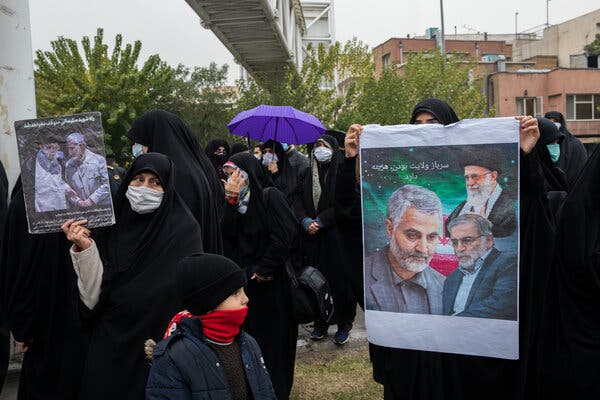Mohsen Fakhrizadeh, an eminent Iranian nuclear scientist, was assassinated near Tehran on November 27. According to Western intelligence, Fakhrizadeh was the driving force behind Iran’s covert nuclear program. Iran’s foreign minister Mohammad Javad Zarif called the incident a form of “cowardice — with serious indication of Israeli role”, and urged the international community, especially the European Union, “to end their shameful double standards and condemn this act of state terror”. Following the incident, Iran sent a letter to UN Secretary General António Guterres, asserting the country’s right to defend and act in accordance with its own national interests. Mohammed Bagheri, chief of staff for Iran’s armed forces, resolved to not rest and track down the perpetrator. Several other Iranian officials also condemned the attack and threatened to retaliate.

Israel has declined to comment on the news of assassination, but many consider it the most likely perpetrator. In 2015, Iran thwarted Mossad, the Israeli intelligence agency, in its attempt to assassinate a nuclear scientist whose identity has not been revealed. Between 2010 and 2012, four Iranian nuclear scientists were murdered and one was wounded in an attempted murder. Israel has neither confirmed nor denied its involvement, but expressed its resolve to not tolerate a nuclear armed Iran by any means. In 2015, the Joint Comprehensive Plan of Action (commonly known as the Iran nuclear deal) was reached, and Israel terminated its assassination campaign after diplomatic pressure from the United States. However, this diplomatic relationship deteriorated after the Trump administration withdrew from the nuclear accord in 2018, undoing years of significant foreign policy achievements. Since then, Iran has continued in increasing its nuclear capacities while condemning the US for reneging on the deal.
It is hard to predict how the incident will affect tumultuous international politics. Some have claimed that with a significant setback to the nuclear program following the death of top nuclear scientists, Iran will be more willing to negotiate with the new Biden administration. Others predict that the assassination will strengthen the rhetoric of the hard-liners in Iran who resist Western pressure, making it harder to restore the nuclear deal. Iran has already moved to increase its uranium enrichment and bar international nuclear inspectors — proving to be an early challenge to the Biden administration’s promises to restore the nuclear deal.
If Israel was indeed behind the attack, what would have been its motive? According to Dina Esfandiary, a fellow at the Century Foundation with expertise on Iran’s foreign relations, the assassination was to incite Iranian retaliation and “to ensure that the Biden administration’s hands are tied when they come in to pursue negotiations and de-escalation”. She further noted that it is highly unlikely that Washington was not informed prior to the attack. After his defeat in the US elections, Trump reportedly asked for military options in Iran. The fact that the Secretary of State Mike Pompeo was in Israel just prior to the attack also heightened speculations. However, officials in Washington have denied any foreknowledge on the assassination, and no conclusive proof of coordination between U.S. and Israel on the attack has been found. In the waning days of the Trump administration, Israel may have seen this attack as the last opportunity to jeopardize potential improvement in relation between Iran and the new Biden administration by provoking Iran’s hardliners. However, it seems unlikely that the fallout will unfold in Israel’s favor, as Iran, weakened by the economic sanction and the recent COVID-19 epidemic, is not seeking military revenge. President Rouhani seems to have read Israel’s moves and made clear that the country will not be lured into a conflict.
If the allegations of US involvement in the assassination are true, Dr. Fakhrizadeh may have been the latest scapegoat of the US’s power struggle. While Fakhrizadeh was the most prominent face of Iran’s nuclear program, the program is not beholden to one person. Ellie Geranmayeh, a senior policy fellow at the European Council on Foreign Relations, remarked: “the objective behind the killing wasn’t to hinder the nuclear programme but to undermine diplomacy.” Regardless of the motive, terrorist attacks of this kind obstruct peaceful dialogues and give voice to radical groups in Iran who claim that peacemaking is futile.

